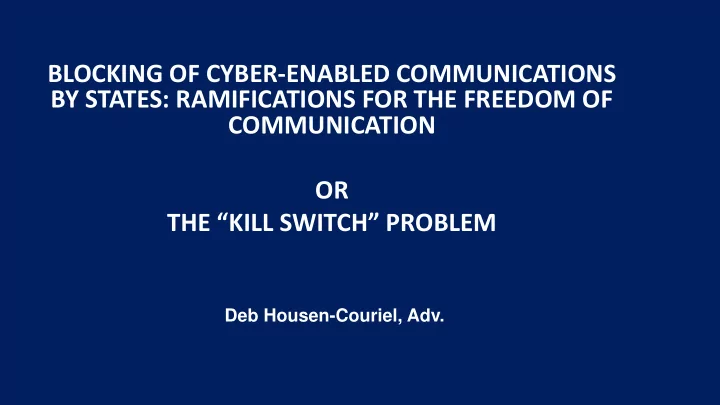

BLOCKING OF CYBER-ENABLED COMMUNICATIONS BY STATES: RAMIFICATIONS FOR THE FREEDOM OF COMMUNICATION OR THE “ KILL SWITCH ” PROBLEM Deb Housen-Couriel, Adv.
“ The government of Ethiopia has demonstrated its ability and willingness to restrict or shut down internet, cellular data, and phone services, impeding the U.S. Embassy ’ s ability to communicate with U.S. citizens in Ethiopia and limiting the Embassy ’ s ability to provide consular services. ”
A “ HOUSTON ” MOMENT ▪ More and more, governments are using their authority to block communications through cyberspace ▪ Often in a manner that is unilateral and non-transparent ▪ January 2011 – Egypt ’ s Tahrir Square protests
Number of gov ’ t interferences continues to rise: #KeepitOn, Brookings Institution - $2.4 billion in 2015 2011 Egypt ’ s Tahrir Square - $90 million
(1) DEFINITIONS (3) ITL (2) INTERNATIONAL RAMIFICATIONS FOR TELECOMMUNICATION INTERNATIONAL What do we mean LAW by government RIGHT TO COMMUNICATE blocking of communications IN CYBERSPACE in cyberspace – and what ’ s excluded
(1) DEFINITIONS: WHAT DO WE MEAN WHEN WE REFER TO THE BLOCKING OF CYBER-ENABLED COMMUNICATIONS BY STATES – AND WHAT ’ S EXCLUDED
THE ISSUE IS NOT ONLY INTERNET SHUTDOWNS • Any intentional disruption by a state to communications through cyberspace. – Internet telecommunication – any transmission, – GPS emission or reception of signs, signals, – cellphone communications writing, images, and sounds or – regular phone or fax lines intelligence of any nature by wire, radio, optical or other electromagnetic systems – satellite imagery “ shutter control ” -- ITU Constitution § 1012 • Technology-neutral
DISTINCT FROM THE SUBSTANTIVE ANALYSIS OF FREEDOM OF EXPRESSION TO ADDRESS ANOTHER ASPECT OF THE USE OF KILL SWITCHES BY GOVERNMENTS TERRORIST SPEECH LIBEL AND ACTIVITY NOT CONTENT CENSORSHIP – RATHER THE CUTOFF OF THE DIGITAL COMMUNICATIONS PRIVACY PERMITTED INFRASTRUCTURE ITSELF PRO- SPEECH TECTION HATE IP SPEECH INFRINGE AND MENT OBSCENITY
(2) INTERNATIONAL TELECOMMUNICATION LAW
▪ Longstanding treaty regime (1865), 1 st IGO, UN Specialized Agency, 193 MS ▪ ITL - the provision of communications globally and the operation of infrastructure to ensure that these communications are seamless
PURPOSES (ART. 1) – to promote the development of technical facilities and their most efficient operation with a view to improving the efficiency of telecommunication services, increasing their usefulness and making them, so far as possible, generally available to the public;
CONVENTION TÉLÉGRAPHIQUE INTERNATIONALE DE PARIS (1865) The HCPs undertake to establish dedicated wires to the international telegraphic service, in sufficient number to ensure rapid transmission of messages. These wires shall be established in the best conditions possible.
3 DISTINCT OBLIGATIONS OF CONDUCT (NOT RESULT, SO SUBJECT TO FEASIBILITY): ▪ TO ENSURE ESTABLISHMENT OF INFRASTRUCTURE ▪ TO MAINTAIN ▪ TO SAFEGUARD 2014
ALIGNS WITH ICCPR 19(3)(B)- LIMITATIONS PROVIDED BY LAW AND NECESSARY FOR THE PROTECTION OF NATIONAL SECURITY, PUBLIC ORDER, PUBLIC HEALTH, OR MORALS.
THERE ’ S A SOVEREIGN RIGHT TO SUSPEND SERVICES – BUT THE STATE MUST SO NOTIFY IMMEDIATELY ON THE INTERNATIONAL PLANE
UNDER ITL, STATES CAN ’ T “ GO ROGUE ” WITH KILL SWITCHES.
STATE PRACTICE OF PUBLIC NOTIFICATION TO ITU OF SUSPENSION/ STOPPAGE OF - • TELEGRAM SERVICES • VOICE OVER INTERNET • COLLECT CALLS • CALLBACK • TEXTING • TYPES OF COMMUNICATIONS TO SHIPS IN PORT • CERTAIN COUNTRIES
NEPAL, November 2017 Notification of unilateral suspension of selected LONGSTANDING international mobile OBLIGATION OF STATE phone communications TRANSPARENCY REGARDING CUTOFF OF COMMUNICATIONS
(3) RAMIFICATIONS FOR THE INTERNATIONAL RIGHT TO COMMUNICATE
▪ ▪ ITL establishes a state obligation There ’ s a view that although outside of human rights law that the ITL regime of the ITU is stipulates an internationally- longstanding and robust - transparent reporting requirement for suspension or stoppage of ▪ the intent of States as communications, including cyber- expressed prior to the enabled current realities of cyberspace cannot ▪ Applicable without prejudice to the question of reasonably hold (David ▪ whether a right to communicate has been Fidler, 2015) established by treaty or custom ▪ Even if the intent holds – ▪ whether government has met the new modes of notification permitted limitations criteria in ICCPR 19(3) needed
IN CONCLUSION: A MIDDLE GROUND • As Professor Schmitt has written recently regarding the grey zones of the international law of cyberspace: “ Legal ambiguity hobbles responses ” on the part of states in cyberspace. • Here ’ s an opportunity for reducing some of that ambiguity.
• If the problem we ’ re trying to solve is how to reduce the cavalier use by states of kill switches, in order to promote the enforcement of the freedom of expression in cyberspace – The ITL regime contains clear norms that have the potential to contribute to the transparency of state activity – There are decades of state practice to which no significant objections are evident. – The use of kill switches for internet and other communications should also be subject to this transparency requirement. A NUDGE
FURTHER ISSUES / QUESTIONS THE ROLE OF PRIVATE A BROADER SECTOR ACTORS EXAMINATION OF THE RELEVANCE OF STATE PRACTICE UNDER ITL TO CURRENT CYBERLAW ISSUES
THANK YOU.
Recommend
More recommend